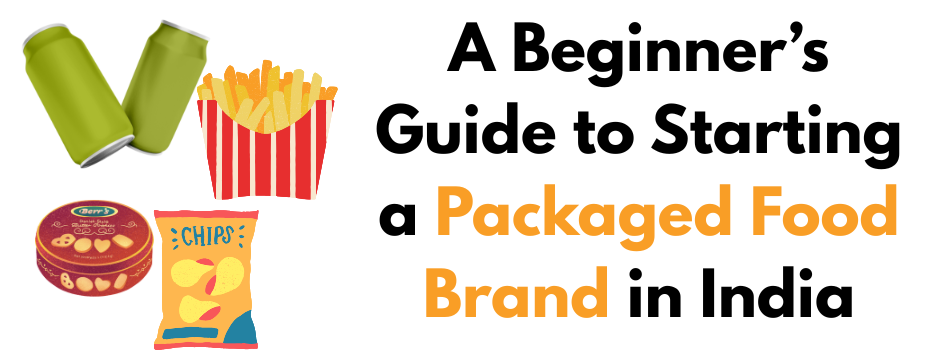The Indian food industry is covered with a wide range of competitive food operators. Therefore, the maintenance of food items has become crucial to prevent health issues. Even if new food business operators are required to adhere to the specific safety and quality standards. What if FBO wants to open a packaged food brand? In this situation, the FSSAI registration becomes mandatory. As per the guidelines, whoever is associated with the food business must obtain the FSSAI license. Let’s break down the blog to know how a beginner can build a packaged food business in India. including label rules and regulations.
What is the Role of FSSAI for Packaged Food Brands?
The Food Safety and Standards Authority of India (FSSAI) plays a vital role in food safety. It is the primary and most recognized Indian authority that is responsible for setting the rules. It even sets packaged food regulations, including science-based standards, production & sale, compliance monitoring, and many more. FSSAI, as the controlling authority, has made it mandatory that all packaged food brands be registered. This is essential in order to create transparency and accountability in the food supply chain.
How Is a Packaged Food Brand Started in India?
When you start a new food business in India, the Food Business Operators (FBOs) will undergo the following process, which will take multiple steps:
Step 1: Market Research and Business Planning
Before you launch the packaged food brand in India, find the time to do market research. Look at what is most in demand in the Indian market. Target specific customers and understand the competitive landscape. Develop a business plan that includes information about product offerings, target markets, etc.
Step 2: Business Structure and Funding
Define whether you want to establish a sole proprietorship, a partnership, or a private limited company. Leverage potential funding to invest in initial requirements. Invest in usable equipment, raw materials, staffing, and marketing. For the funding, choose the loan or venture capital option.
Step 3: License and Registration
To adhere to packaged food regulations in India, one must apply for FSSAI FoSCoS registration. Meanwhile, the operation registration or licensing depends on the food business scale. The types of food licenses are as follows:
- FSSAI Basic Registration: The food business operators whose annual turnover is up to Rs 12 lakhs. The issuing authority is ‘Food Commissioner.’
- FSSAI State License: FBOs whose turnover lies between Rs 12 lakhs and Rs 20 crore. It is also issued by the ‘Food Commissioner.’
- FSSAI Central License: The food business whose annual turnover exceeds Rs 20 crore. Those who further import and operate in more than one state are also required to have a central license. Its issuing authority is the Central FSSAI.
- Other Required Registration: A GST registration certificate is mandatory for a food packaging business license. If you have a food manufacturing unit, apply for a Pollution Control Board Certificate.
Step 4: Product development and Sourcing
The produced food product must contain consistent quality, further matching consumers’ preferences and taste requirements. Choose the right suppliers for your primary food ingredients who focus on quality and consistency.
Step 5: Packaging and Branding
Attractive packaging is the gateway to gaining potential consumers. Design eye-catching food packaging. With it, add details such as brand name, product details, and all required information. Do not forget to add the net quality, used ingredients, manufacturing and expiry dates.
Step 6: Operation and Launch
Choose a suitable location where you want to sell food. For fast food service, hire trained food experts. Get reviews from consumers to improve food quality. Keep monitoring packaged food quality.
Also Read About: How FSSAI Regulations Are Shaping the Future of Street Food Vending?
What are the Packaged Food Regulations in India?
In the above section, we have discussed the route to establish a packaged food brand. As FSSAI registration is mandatory, the management and adherence to food regulations are also crucial. Here is the breakdown of specific legal regulations related to food and its management:
- Under the Food Safety and Standards Act 2006, the FBOs must adhere to the Food Safety and Standards (Packaging & Labeling) Regulations 2011.
- The selected material must be secure and free from leaking, and must not affect the food quality.
- To adhere to labeling requirements, include these details on the package:
– Food detailed description
– Ingredients list in descending order (mention volume or weight)
– Add nutritional information such as energy, protein, etc, per serving or 100 g.
– Status of non-veg or veg.
– Food name and location
– Dates and identification information
– Product net quality
– Label the country of origin.
- For label approval for food products, the FSSAI logo and other relevant license numbers must be visible on the packaging
- Food labels must mention accurate details of the information; misleading or deceptive details can cause potential legal risks.
Final Thoughts | FSSA Food Registration Apply Online
For the establishment of a packaged food brand, navigating the FSSAI registration process is mandatory. The serving authority issues a license on the basis of the food business scale and turnover. However, to avoid legal issues, complying with FSSAI food rules and regulations is critical. Avoid labeling the misleading or false information on the food package. Still confused about where to start your food brand journey? Choose FSSAI Food License as your trusted legal consultant.

